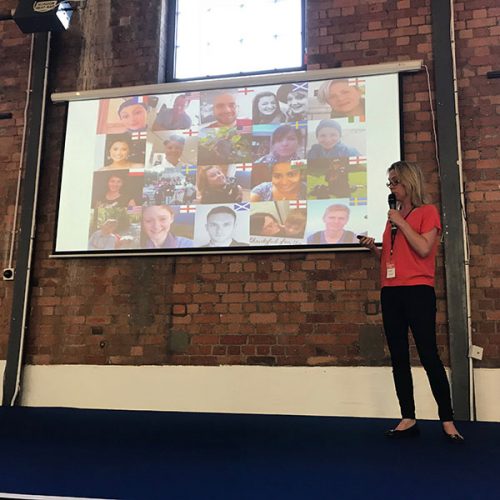For traditional startup founders, entrepreneurs and investors, the goal is often simple – come up with a brilliant idea that will change the world (or invest in one), see it grow and make a profit in the process. This could be by disrupting the global taxi industry or perhaps even building an e-commerce bookstore that transforms into one of the biggest companies in the world (no bonus points for guessing who we’re talking about here).
Accountability is seen as key to having a successful intervention
For charities and NGOs, the goal is very different. Making a profit is not high on the agenda, with the main form of income from donations and grants and the priority to positively impact a specific section of society or cause.
Impact investment, on the other hand, is a growing space that combines both of these worlds – proving that impact and profit can go hand in hand. Driven largely by a younger generation motivated by growing social and environmental concerns and a desire for day jobs to have purpose and meaning, it’s becoming less of a dream world and more a reality for many businesses around the world.
Something that’s close to home at Simpleweb, one of our very own investees – the food-sharing startup OLIO – has just raised a huge $6million of Series A investment. You can read about how they did it in our interview with co-founder Tessa Clarke here.
 For Hannah Barkan (pictured left), an Investment Analyst at Big Issue Invest, making an impact has always been a priority. But during her work with NGOs in Palestine, she found that the grant money and donations being fed into organisations didn’t necessarily equate to real impact on the ground. Frustrated, she went in search of ways to do things a bit differently.
For Hannah Barkan (pictured left), an Investment Analyst at Big Issue Invest, making an impact has always been a priority. But during her work with NGOs in Palestine, she found that the grant money and donations being fed into organisations didn’t necessarily equate to real impact on the ground. Frustrated, she went in search of ways to do things a bit differently.
“I soon came across impact investing and the idea that organisations should be financially sustainable and that they can be for-profit and still have an impact”, she tells us.
“NGOs are often not held accountable to their donors and I liked the idea that, within impact investment, accountability is seen as key to having a successful intervention.”
Defining impact
Although impact investment is a relatively new space, it’s already something that’s disrupting the traditional investment world. Yet its newness often makes it hard to understand and to define.
For Hannah, impact investment is about investing for both financial and social or environmental return.
That said, there are still quite a broad range of impact investors. At one end you have impact-led investors like Big Issue Invest and on the other you have the ESG screenings that are carried by some larger financial institutions. These ensure the companies they invest in have at least some positive impact either environmentally, socially or at a governmental level .
For businesses however, the definition is clearer. Hannah explains: “What it’s really about is having an intentional positive impact.
“We really look to align ourselves with social organisations who want that influence from a social investor and who really want to build their organisation and avoid drifting from their impact mission.”
Sustaining change
Profit and growth is still important and financial sustainability is essential
Of course, as Hannah already mentioned, in order for an impactful business to succeed in their mission they need to be financially sustainable. Their actions need not only serve the cause, but serve financial growth of the business in the traditional sense.
What might not come as a surprise then, is that impact investors have very similar standards when it comes to assessing the viability of a business.
“Profit and growth is still important and financial sustainability is essential – but these things don’t replace impact” says Hannah.
“What impact investors are looking for is a clear intentional impact mission. But also an experienced team that know the business and the market really well and have significant experience to start it.
“In order to be successful in this space, you do have to be innovative and you do have to do things differently. But as an investor, when you find an organisation that are combining all of those factors – they’ve come up with an innovative solution to solve a deep rooted problem that’s also financially stable, it’s incredible. It’s these organisations that are making a really big change.”
Mission drift
With financial stability important but not central, Hannah explains some of the other things impact investors often look for in startups and entrepreneurs they wish to invest in.
When someone really believes in a social mission, that impact will trickle down into other areas of their business
“In terms of measuring impact” Hannah explains, “we’ve developed our own framework that helps us to evaluate the output of the investment.
“But the idea that we might need some kind of formalised way of measuring impact is debated often within the impact investment space, with some seeing this as being too rigid and others wondering if it’s necessary to keep things flexible. This is a conversation that will keep developing over time.
“It’s not always easy to tell how deeply somebody believes in something in the early stages of the process. However, we want to know that when things get tough financially or otherwise, that we can feel confident that founders will stick to their impact mission.
“Usually, when someone really believes in a social mission, that impact will trickle down into other areas of their business. So if a business is fulfilling a social need but is not treating their staff well, for example, that’s always a flag for us. And although we’re talking about profit-making businesses, we’ll usually consider what they intend to do with their profits – where the money is going and what the makeup of the company is.”
Getting it right
For founders with a strong desire to make a positive change in the world, getting it right is important. Impact investors work hard to ensure that businesses are financially viable but also 100% true to their impact goals before letting go of their hard won funds – so pitching can be an incredibly daunting prospect.
People are aware that there’s a way to do things differently
“Founders should send out an investment pack that’s well prepared and investors will take notice”, Hannah advises.
“But they need to make sure they really understand the problem they’re solving, how they’re solving it and how they’re going to be financially stable because that shows that they’ve thought about why an investor might want to invest.
“As investors, we want to feel confident that founders have thought about what investment would mean, what they would be using it for and how they would repay it.
“For someone coming into the space with no knowledge of how to find and attract impact investors, the website Good Finance is a good place to start. It aims to be a resource for the impact investing industry and is targeted towards social enterprise, making it easier for founders to find impact investors and to understand what type of investment is right for them.”
The future is bright
Whilst impact investment may have been driven by frustrated younger generations, at least initially, this is something that is gradually becoming a large part of the global business consciousness.
“Impact investment is growing and, even across all age groups, more and more people are interested in where their money is going. People are aware that there’s a way to do things differently”, Hannah explains.
We need to keep producing and publishing the evidence that social investments do work
“Mainstream financial institutions are coming on board and you have different players that are getting involved on a big and small scale. It always starts with smaller organisations but now we see bigger financial institutions like banks and pension funds getting involved in impact investing. And they’re really the ones that will propel it forward.
“That said, we do need to keep producing and publishing the evidence that social investments do work. That they grow and pay back their investors whose funds get bigger and bigger. This is the proof that will encourage more traditional investors to get involved.
“But, wherever you are in the world, there is a growing awareness of this increasingly huge disparity between those of us who have things and those who do not – and I don’t think we really have a choice.”
Big Issue Invest extends The Big Issue’s mission by financing the growth of sustainable social enterprises and charities across the UK. For more information go to: www.bigissueinvest.com.
To apply for investment from Simpleweb for your early-stage startup, just fill out this application form.



